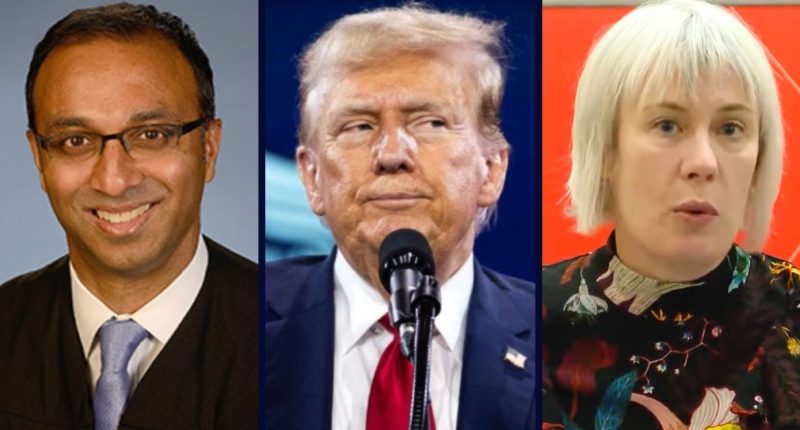Share this @internewscast.com
Left: U.S. District Judge Amit Mehta (via U.S. District Court for the District of Columbia). Center: Donald Trump speaks at the annual Road to Majority conference in Washington, DC, in June 2024 (Allison Bailey/NurPhoto via AP). Right: Attorney Sarnata Reynolds (YouTube/Skoll.org).
A Maryland attorney has been compelled to clarify why she referenced a “seemingly non-existent” case in a recent immigration court dispute against the Trump administration, as a federal judge questioned her after the case concluded with a dismissal.
“The court has found no such case on Westlaw or in the court’s electronic docketing system,” remarked U.S. District Judge Amit P. Mehta in a Tuesday order. Mehta would be informed: it was his own federal district — the District of Columbia — that was purportedly familiar with the case, according to the disputed filing.
“Counsel for plaintiff shall show cause by July 11, 2025, why the court should not sanction her for citing Moms Against Poverty v. Department of State,” wrote Mehta, a Barack Obama appointee.
Love true crime? Sign up for our newsletter, The Law&Crime Docket, to get the latest real-life crime stories delivered right to your inbox.
Attorney Sarnata Reynolds, of the Maryland-based immigrant advocacy group Ceartas Solutions, is accused of citing the “non-existent” case in a response brief filed on June 20. Reynolds was representing a foreign doctoral student at Georgetown University, identified as “Student Doe,” who sued the Trump administration after his student registration was revoked “without notice, explanation, or opportunity for Student Doe to respond,” per his complaint.
“Student Doe’s doctoral work in quantum computing addresses critical national priorities in scalable quantum systems, an area that is of strategic significance to the U.S. government and vital to maintaining competitiveness in global cybersecurity, encryption, and defense technologies,” the complaint said. “On April 10, 2025, Georgetown notified Student Doe that DHS had terminated his F-1 record in SEVIS and marked Student Doe as ‘OTHER – Individual identified in criminal records check, and/or has had their visa revoked. SEVIS record has been terminated.'”
The student’s legal team, which included lawyers from the group RFK Human Rights, claimed the revocation had “deprived him of his legal status, ability to conduct research and teach, and access to income,” along with exposing him to “immediate risk of arrest, detention, and removal — all without any legitimate legal or factual basis.”
The “seemingly non-existent authority” in question, as Mehta describes it, was used to argue why the court should issue a preliminary injunction to “prevent continued harm from an unlawful termination that has not been fully reversed,” in reference to Student Doe’s registration being revoked. “Courts in this District make clear that at the PI [preliminary injunction] stage, plaintiffs need only demonstrate a likelihood of jurisdiction, not conclusively prove it,” Reynolds said, before citing “Moms Against Poverty v. Dep’t of State.”
The case was dismissed on Monday, June 30.
Reynolds was given a total of 10 days to explain why she should not be sanctioned. She did not respond to Law&Crime’s requests for comment Wednesday.
















